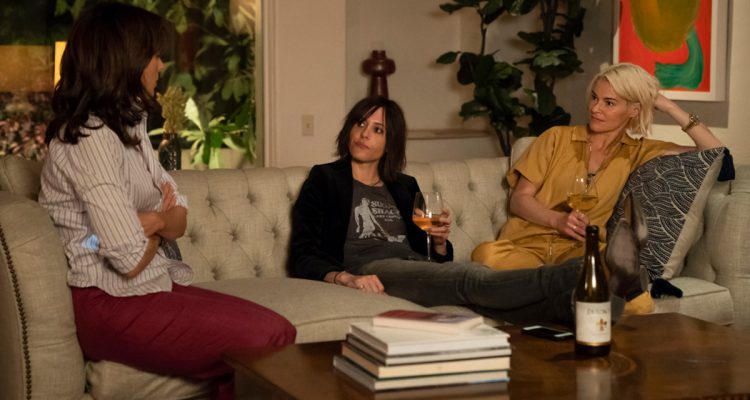“The L Word: Generation Q” cuts right to the chase, opening on a half-naked woman as she enjoys some pre-work cunnilingus with her girlfriend. The lovebirds, Sophie (Rosanny Zayas) and Dani (Arienne Mandi), make up half of the show’s titular Generation Q (as in queer), accompanied by their roommate Micah (Leo Sheng) and friend Finley (Jacqueline Toboni). This ensemble, with the help of some of their foremothers – Shane (Kate Moennig), Alice (Leisha Hailey), and Bette (Jennifer Beals) – attempts to recreate the delicious, melodramatic magic of the original “The L Word.” And, apart from some wooden performances and the dubious choice to delineate between a “lesbian” generation and a “queer” one, they succeed.
It’s difficult to overstate the cultural impact of “The L Word,” a show best enjoyed either with a rowdy group or alone, in the proverbial closet, while you tried to figure out why you liked your best friend so much. There had never been a show like it (in terms of lesbian theme, longevity, and success) before its 2004 premiere, and there hasn’t been one since it ended in 2009. It was so popular and has since become so iconic because it alone filled the lesbian TV niche.
After we meet the new crew, complete with a breakneck rundown of their relationship baggage (Sophie and Dani: want to be engaged but Dani is dragging her feet, Micah: navigating the gay world as a trans man, Finley: himbo), it’s time for the original gang to reunite. Alice is balancing pseudo-stepmotherhood and her new talk show, Bette is running for mayor of Los Angeles, and Shane is breaking hearts and somehow obscenely rich. (The other characters from the original show are nowhere to be found, though Tina gets a few mentions as Bette struggles to raise their now teenage daughter.) Circumstances and the theme song may have changed (rest in power, Betty), but these beloved original characters have not.
In the era of Peak TV, you might find yourself asking, “But is ‘The L Word: Generation Q’ good?” Any true fan of “The L Word” would know to never ask this. “The L Word” was an R-rated soap opera, as likely to make you laugh at its absurdity as it was to make you cry at a character death. ‘Generation Q’ seems primed to follow in those footsteps, revealing new plotlines within the first three episodes that will have you gasping and giggling anew. (Spoiler alert: Bette and Shane are still stupid. Alice is still commenting on it.) But that success hinges on our investment in the new characters. Jacqueline Toboni wins as Finley, even when she’s not given much to work with, and Rosanny Zayas infectiously plays out Sophie’s happier moments. “Juno” scene-stealer Olivia Thirlby gets a delicious minor role. Unfortunately, Arienne Mandi, who gets ample screen time as Dani, brings big “Degrassi” energy to the mix, and Leo Sheng (admittedly underutilized) offers Micah limited emotional range.
As the show expands to include the much broader spectrum of queer identities alongside its lesbian cast, you might fear the loss of its cultural specificity. Fret not. ‘Generation Q’ is slightly looser than its predecessor – which did not, for instance, include man-on-man action – but it still focuses on lesbian relationships and culture. Its younger characters’ preference for the Q word grates only because such a false correlation between age and sexual postmodernism implies an absence of lesbian-identified young women. They exist. Most of them watched “The L Word” in college.
The first season of “The L Word” has a lot of ground to cover in a scant eight episodes, but this joyous cast and crew is (mostly) game for the task. And if the plot falls apart, well, it’s “The L Word.” We’ll all have fun anyway. [B]

